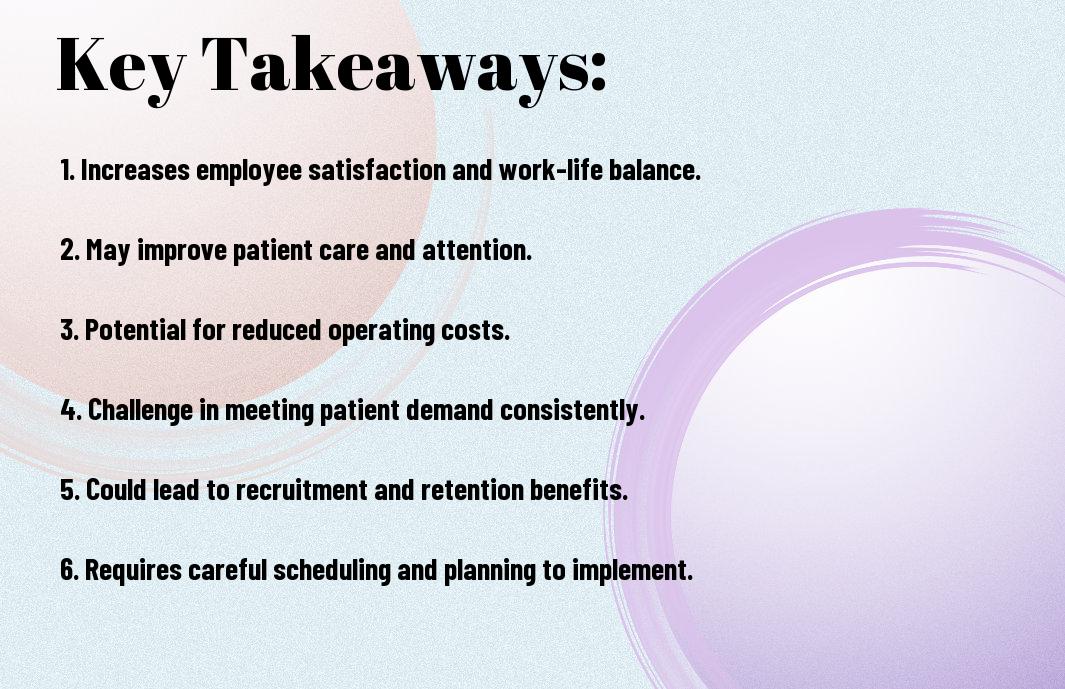Should Your Dental Practice Offer a Four-Day Workweek? Pros and Cons
There’s growing interest in the idea of a four-day workweek for dental practices, but before you consider making the switch, it’s important to weigh the pros and cons. You might find potential benefits, such as improved employee satisfaction and increased productivity, alongside challenges like managing patient demand effectively. In this post, I will explore the various aspects that can influence your decision, guiding you through the factors to consider when exploring this modern work model. Your practice’s success and your team’s well-being depend on making informed choices.
Key Takeaways:
- A four-day workweek can enhance staff well-being and reduce burnout, potentially leading to improved productivity and job satisfaction.
- Patients may appreciate longer appointment times and dedicated services, but scheduling and managing patient care within a shorter week could be challenging.
- The financial impact must be evaluated, as a four-day week could affect revenue if not properly managed through optimized scheduling or increased patient volume.
- Recruitment and retention of talent may improve, as many dental professionals are drawn to flexible work arrangements, making your practice more competitive.
- Implementation requires careful planning and communication with staff and patients to ensure a smooth transition and continued quality of care.

Understanding the Four-Day Workweek Model
Before entering into whether your dental practice should adopt a four-day workweek, it is vital to grasp what this model entails. This approach allows employees to work a full week’s worth of hours in just four days, often with longer daily shifts, enabling an extended weekend. Understanding its implications, benefits, and challenges will better equip you to evaluate its potential fit for your practice.
Definition and Common Structures
The four-day workweek typically consists of ten-hour workdays, providing employees with three consecutive days off. While some organizations opt for this setup to enhance work-life balance, others may follow a more flexible structure, adjusting the hours in a way that fits their operational needs and employee preferences.
Current Trends in Dental Practices
Among the growing number of dental practices, there is a remarkable shift toward adopting a four-day workweek. Many practitioners are realizing that this model not only enhances employee satisfaction but can also lead to improved patient care. You might find that dental teams working fewer days can be more focused and engaged during patient appointments.
Due to a significant emphasis on work-life balance and employee wellness, dental practices are increasingly testing the waters of a four-day workweek. This trend reflects a broader industry shift towards attracting talent retention and reducing burnout among staff. Additionally, studies have surfaced showing that shorter workweeks can lead to increased productivity and job fulfillment. By considering this model, you could position your practice as a progressive workplace that values both employee well-being and patient satisfaction.

Potential Benefits of a Four-Day Schedule
There’s a growing trend among dental practices to adopt a four-day workweek, which can lead to significant advantages for both staff and patients. By reducing the number of workdays, you might witness improvements in productivity, morale, and overall office dynamics. This shift not only enhances efficiency but also positively impacts your practice’s reputation in the community.
Enhanced Work-Life Balance for Dental Staff
The four-day workweek provides your dental staff with an enhanced work-life balance, allowing them to recharge and spend time with family and friends. This added flexibility contributes to lower stress levels and promotes mental well-being, which can ultimately lead to better patient care.
Increased Employee Satisfaction and Retention
Below an improved work-life balance, I observe a noticeable rise in employee satisfaction and retention, as team members feel valued and motivated in their roles. Implementing a four-day workweek can create a sense of loyalty, reducing turnover and the costs associated with hiring and training new staff.
Benefits speak volumes when it comes to employee retention. A four-day schedule allows for personal time, which contributes to an overall better work environment. Staff members who feel happy and satisfied are likely to stay longer, lowering recruitment costs and improving team chemistry, and ultimately creating a more cohesive practice.
Potential for Extended Daily Hours and Patient Accessibility
After adopting a four-day workweek, you may find the potential for extended daily hours becomes more manageable, allowing for increased patient accessibility. Longer workdays on fewer days can provide your patients with more appointment options, accommodating those with busy schedules.
With longer operating hours condensed into four days, you’re opening the door to attract patients who may struggle to find time during traditional hours. This flexibility can enhance patient satisfaction and retention, ultimately contributing to the growth and success of your practice.
Financial Considerations
Your dental practice’s decision to implement a four-day workweek requires careful examination of the financial implications. While the idea may initially sound appealing, it’s imperative to analyze how it could influence your revenue and cost structure. I suggest evaluating your current financial performance and determining how reduced hours might impact patient retention, appointment frequency, and overall cash flow.
Revenue Impact Analysis
Above all, understanding how a four-day workweek could affect your practice’s revenue is fundamental. Transitioning to a condensed schedule may lead to diminished appointment availability, which could affect your ability to generate income. However, if managed correctly, you might see increased patient satisfaction and retention, ultimately balancing out any initial losses.
Overhead and Operational Costs
Considerations associated with the four-day workweek also include your overhead and operational costs. Shifting to a shorter schedule may involve varying expenses like staffing, utilities, and supplies. Moreover, you’ll need to assess if your current resources can efficiently accommodate the same number of patients within fewer days.
Due to the potential reduction in operational time, you might find it necessary to optimize your staffing levels and overhead expenses. This can lead to opportunities for cost savings if you manage it effectively; however, if not handled properly, it could result in unintended financial strain. Investing in streamlined processes and technology may also help maintain patient throughput while delivering quality care, ultimately ensuring the practice remains profitable.
Patient Experience Factors
Many practices considering a four-day workweek must assess potential impacts on the overall patient experience. Key factors include:
- Appointment Availability
- Patient Satisfaction
- Practice Adaptability
Assume that making this shift can lead to improved employee well-being, impacting how you engage with your patients.
Appointment Availability and Scheduling
Scheduling becomes a pivotal aspect when transitioning to a four-day workweek. This change may limit appointment availability, which could create challenges for you in accommodating both new and existing patients. It’s vital to explore optimized scheduling strategies to maintain a seamless flow and prevent any adverse effects on patient care.
Patient Perception and Satisfaction
Perception of a four-day workweek in your dental practice could vary widely among patients. They might associate fewer available days with decreased accessibility, leading to concerns about receiving timely care. I must ensure you articulate the benefits of this new structure clearly, emphasizing that a focused, rested team leads to higher quality care.
Also, addressing perception is vital for maintaining patient satisfaction. If your patients feel assured that their care is a priority, they are likely to adjust positively. I recommend engaging with your patients to discuss their preferences, which can help mitigate concerns. Additionally, consider highlighting the enhanced service quality that can emerge from a happy, well-rested team focused on providing exceptional care. Building trust and showing commitment to their experience will help retain loyalty, even amidst changes.
Implementation Strategies
To successfully adopt a four-day workweek in your dental practice, you need to develop a clear plan that outlines how this change will be executed. This involves assessing your current workflow, determining the feasibility of reduced hours, and ensuring that patient care is not compromised. I recommend involving your team in the decision-making process, as their input will provide valuable insights and foster a sense of ownership over the new schedule. Additionally, I suggest evaluating your practice’s financial health and patient demand to align your resources with this innovative approach.
Staffing Models and Scheduling Options
Against adopting a four-day workweek, one should consider various staffing models and scheduling options. For instance, you might explore staggered shifts to maintain patient coverage without overwhelming your team. I believe that using flexible schedules can ensure that patient needs are met while allowing staff to enjoy the benefits of a shorter workweek. Engaging with your staff to understand their preferences can lead to a solution that balances operational needs and employee satisfaction.
Transition Planning and Communication
Transitioning to a four-day workweek requires careful planning and open communication with your staff and patients. I find it crucial to establish a timeline that outlines key milestones in the transition process and encourages dialogue throughout. This way, you can address concerns, collect feedback, and celebrate successes together. Regular updates will ensure that everyone stays informed and committed to the new structure, which can significantly enhance the overall experience as you navigate this shift.
At this stage of the transition, it’s important that you provide clear, consistent communication to your employees about the changes. I recommend holding regular meetings to track progress and address any issues that arise. Keeping your staff engaged will reduce resistance and foster a positive atmosphere. Additionally, actively reaching out to your patients is vital; they deserve to know how this new schedule may affect their appointments. By offering FAQs, personal anecdotes, and open lines of communication, you can ensure a smooth transition that benefits everyone involved.
Legal and Practical Considerations
Not all dental practices are equipped to transition to a four-day workweek without serious legal and practical ramifications. It’s imperative to thoroughly assess your current staffing, patient load, and any labor laws that may apply to your region. Moreover, the implications for patient care and staff morale should not be overlooked, as these factors can significantly impact your practice’s overall success.
Employment Contracts and Compensation Adjustments
Above all, if you decide to implement a four-day workweek, you’ll need to revisit employment contracts and make necessary compensation adjustments. Wages might need to be recalibrated based on the number of hours worked and service delivery expectations. Ensure transparent communication with your team to navigate these changes smoothly.
Regulatory Compliance
Considerations regarding regulatory compliance are paramount when shifting to a four-day workweek. This includes understanding labor laws that govern working hours, mandatory breaks, and overtime pay in your area. Failing to comply can lead to significant legal repercussions, including fines or lawsuits, which could jeopardize your practice’s stability.
Understanding labor laws in your region is imperative for avoiding legal issues down the line. Overtime regulations can differ significantly from state to state, and not adhering to these can result in costly penalties. Additionally, some regulations may stipulate specific conditions under which you can alter work schedules without violating employee rights. By doing your homework upfront, you can actively mitigate risks and create a healthy, compliant work environment. Ultimately, I advise consulting with legal counsel to ensure your new structure aligns with all relevant regulations and supports your practice’s long-term viability.
Conclusion
With these considerations in mind, I believe that the decision to implement a four-day workweek in your dental practice ultimately depends on your specific goals, staff needs, and patient demand. While this model can enhance work-life balance and potentially improve staff retention, it also poses challenges such as scheduling and profitability. I encourage you to weigh both the advantages and disadvantages carefully. As you assess the potential impact on your practice, consider conducting surveys or discussions with your team to gauge interest and feasibility before making any changes.
FAQ: Should Your Dental Practice Offer a Four-Day Workweek? Pros and Cons
Q: What are the potential benefits of a four-day workweek for a dental practice?
A: A four-day workweek can lead to improved employee morale, higher job satisfaction, and increased productivity. Staff members may feel more motivated and less burnt out, which can enhance the quality of patient care. Additionally, having an extra day off can help attract top talent looking for better work-life balance.
Q: Are there any drawbacks to implementing a four-day workweek in a dental practice?
A: Yes, there can be drawbacks. One major concern is potential reduced availability for patient appointments, which could disrupt patient flow and revenue. Additionally, the compressed work schedule may lead to longer daily hours, potentially creating staff fatigue or stress. Effective scheduling and clear communication are imperative to mitigate these issues.
Q: How might patients react to a dental practice adopting a four-day workweek?
A: Patient reactions can vary. Some may appreciate the extended hours of operation, while others might be frustrated by limited availability for appointments. It’s imperative to communicate the reasons for the change and ensure that patients are aware of the new schedule well in advance to manage expectations.
Q: Can a four-day workweek improve a dental practice’s retention rates?
A: Yes, implementing a four-day workweek can significantly enhance employee retention. A better work-life balance often leads to higher job satisfaction, reducing turnover rates. Employees are more likely to stay with a practice that promotes flexibility and well-being, saving the practice time and resources spent on recruiting and training new staff.
Q: How can a dental practice prepare for the transition to a four-day workweek?
A: To prepare for the transition, practices should engage staff in discussions about scheduling and gather feedback to address concerns. Implementing a phased approach and piloting the schedule can help assess its impact on patient care and employee satisfaction. Clear guidelines for appointment scheduling and patient communication are also imperative.
Q: What are the financial implications of adopting a four-day workweek in a dental practice?
A: Financial implications can vary depending on how the practice adjusts its schedule and patient appointment volumes. While there could be initial concerns about dropped revenues due to fewer working days, effective scheduling might lead to increased efficiency and patient volume on the days staff are available, potentially offsetting losses.
Q: What factors should be considered before deciding on a four-day workweek?
A: Before deciding to implement a four-day workweek, practices should consider factors such as staff preferences, patient needs, operational capacity, and potential impact on revenue. Evaluating industry trends and looking at how similar practices have fared can also provide valuable insights into making this important decision.


